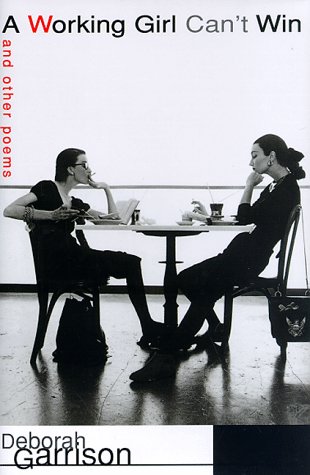A Working Girl Can’t Win: And Other Poems
₱844.00
Product Description
Deborah Garrison, whose work as an editor and writer has enlivened the pages of The New Yorker for more than a decade, evokes the characters and events of her everyday life with intense feeling and, more important, conjures up the universal dilemmas and pleasures of a young woman trying to come to terms with love and work.
From the Trade Paperback edition.
Amazon.com Review
Every couple of years, some unlucky soul gets designated as the Poet for People Who Hate Poetry, and now it seems to be Deborah Garrison’s turn. It’s easy to see why: she gets the voice of the late 20th-century New Yorker to perfection, in all its kvetchy, melancholic glory. At times it’s like hearing George Costanza channeling Emily Dickinson:
I’m never going to sleep with Martin Amis or anyone famous.
Garrison also tends to sidestep metaphysics in favor of more accessible subject matter. That means love (mostly unrequited) and work (mostly unbearable, particularly for a working girl in a testosterone-driven office, wearied by the appearance of yet “another alpha male– / a man’s man, a dealmaker”). No wonder Garrison seems so appealing. And no wonder her publisher has capitalized on this appeal by packaging her book in such a sleek, chic jacket. It would be a mistake, however, to write her off as one more neurotic light versifier. Her metaphoric agility can take you by surprise: note the Atlantic breeze coming “up out of the surf / like a dog gone swimming, / slagging sand and spray every which way / and making the news unreadable.” So, too, can the note of resignation that undergirds so many of Garrison’s vignettes-in-verse, giving even her most featherweight performances an odd, unchic intensity.
From Library Journal
Garrison, a New York-based poet and senior editor at The New Yorker, has produced this slim volume of highly accessible poetry: the talented observations of a bright young career woman preoccupied with men, sex, clothes, domesticity, and office politics. One only wishes that Garrison would use her vivid skills with the language (“the sun’s fuzzy mouth sucking the day back”) to explore issues and scenery that more deeply touch the reader’s soul. She’s capable of gorgeous images; of peonies she writes, “I used to hate/ their furry scent, their fat cheeks packed/ with held breath, the way they’d crumple open/ later, like women in tears.” And her poems ring with inner rhythms and off-rhymes, along with smug, self-confident humor: “Are her roots/ rural, right-leaning? Is she Jewish,/ self-hating? Past her sell-by date,/ or still ovulating?” Garrison entertains but shallowly. Recommended with some reservations for larger public libraries.?Judy Clarence, California State Univ. Lib., Hayward
Copyright 1998 Reed Business Information, Inc.
Review
“An intense, intelligent and wonderfully sly book of poems that should appeal as much to the general reader as to the poetry devotee.”
–The New York Times Book Review
“With their short lines, sneaky rhymes, and casual leaps of metaphor, Garrison’s poems have a Dickinsonian intensity, and the Amherst
recluse’s air of independent-minded, lightly populated singleness. Many a working girl will recognize herself in the poems’ running
heroine, and male readers will part with her company reluctantly.”–John Updike
“Wry, sexy, appealing — with a wonderful lyric candor.”–Elle
From the Trade Paperback edition.
From the Inside Flap
ison, whose work as an editor and writer has enlivened the pages of The New Yorker for more than a decade, evokes the characters and events of her everyday life with intense feeling and, more important, conjures up the universal dilemmas and pleasures of a young woman trying to come to terms with love and work.
From the Trade Paperback edition.
About the Author
Deborah Garrison was born in Ann Arbor. She was educated at Brown University and New York University. She is now a senior nonfiction editor at The New Yorker, where she has w










